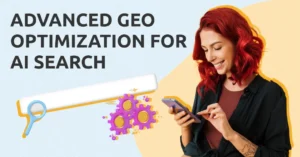
The Rise of Generative Engine Optimization: Navigating the New SEO Landscape
In recent times, the digital marketing landscape has undergone a seismic shift, primarily driven by advancements in artificial intelligence (AI). The release of Google’s AI Overview in May 2024 signaled a critical turning point for search engine optimization (SEO), ushering in a new paradigm known as Generative Engine Optimization (GEO). This evolution challenges traditional SEO practices and opens the door for new strategies that emphasize AI-driven outcomes, prompting marketers to rethink their approaches for greater visibility and engagement.
One key observation is that AI-generated content is increasingly infiltrating search results, with over 13% of top-rated content on Google attributed to AI generation. As a result, marketers are tasked with optimizing their web content to align with the principles of GEO—focusing on user intent and conversational keywords rather than conventional metrics such as backlinks. This transformation not only reshapes the content creation process but also highlights the importance of understanding how AI interprets and prioritizes information.
To effectively implement GEO strategies, it is crucial to ensure content relevance by creating materials that directly respond to user inquiries. This includes the integration of long-tail and question-based keywords that cater to common searches. Moreover, crafting AI-friendly snippets that succinctly convey information assists AI systems in summarizing content, thereby enhancing the chances of achieving higher rankings in search results. These tactics enable marketers to establish a deeper connection with their audience by presenting information in a format that resonates with both users and AI algorithms.
A notable component of GEO involves mastering natural language processing (NLP). By leveraging language and key phrases that align with AI’s comprehension abilities, content creators can enhance their chances of being prioritized in search outcomes. Furthermore, consistently updating content to remain relevant will ensure sustained visibility as AI standards continue to evolve.
For those within specific sectors, industry-tailored strategies are available, enabling marketers to refine their approach based on their unique audience demands. Whether in eCommerce, healthcare, legal, finance, education, or travel, optimizing relevant content to engage with AI search engines is vital. By focusing on quality citations and authoritative sources, businesses can build credibility within their respective industries, thereby improving their overall authority in the digital space.
Tracking the success of GEO strategies is achievable through traditional performance metrics such as keyword rankings, website traffic, and conversion rates. Tools like Semrush can be instrumental in monitoring performance, particularly concerning AI search results. Yet, it is important for marketers to remain aware of potential challenges, as increased competition in AI search results will necessitate a careful balance between traditional SEO and GEO strategies.
As digital marketers navigate this evolving terrain, it is evident that the integration of GEO will become synonymous with effective marketing strategies. Emphasizing user intent while maintaining a strong content structure and authority will prove paramount in achieving desired outcomes. Anticipating a future characterized by a hybrid approach, blending traditional SEO with GEO practices is essential for thriving in an increasingly competitive environment.
Moreover, the relationship between GEO strategies and link management tools cannot be overlooked. Utilizing URL shorteners and custom domain short links can enhance content shareability and engagement. By employing innovative short link management solutions, marketers can effectively track user interactions, allowing for refined strategies that resonate with target audiences. Thus, the synergy between GEO and tools like URL shorteners is ripe for exploration, providing a pathway to heightened visibility and engagement across digital platforms.
In conclusion, adapting to the rise of AI in search engine methodologies is no longer optional for marketers. GEO represents a crucial development in the ongoing evolution of digital marketing. Embracing this new phase, coupled with strategic link management practices, will enable organizations to better navigate the intricate dynamics of a hybrid SEO landscape.
#BitIgniter #LinksGPT #UrlExpander #UrlShortener #SEO #数字营销 #内容营销
Want to know more: https://influencermarketinghub.com/geo-optimization-strategies/

